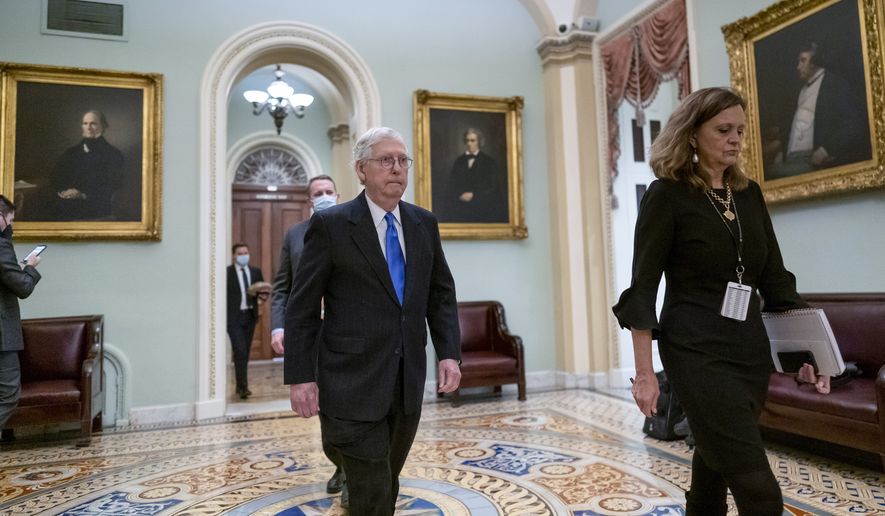Fourteen Senate Republicans crossed-party lines on Thursday to advance legislation creating a one-time filibuster carveout so Democrats can unilaterally raise the nation’s borrowing limit.
Led by Senate Minority Leader Mitch McConnell, the 14 Republicans voted alongside all 50 Senate Democrats to end debate on the topic. The move helped clear the way for the Senate to pass the carveout later in the day.
GOP lawmakers said the one-time carveout is a win because it pushes Democrats into raising the debt limit, a cap on how much the government can borrow to pay for federal expenditures, on their own.
“The whole country understands that Democrats own this mess,” said Mr. McConnell. “They have seized one-party control of the economy, so you better believe they’ll have one-party accountability for the resulting nightmare.”
Senate Majority Leader Charles E. Schumer, New York Democrat, called the deal “the responsible path forward. No brinkmanship, no default on the debt, no risk of another recession.”
Joining Mr. McConnell in helping the measure advance were a wide array of GOP lawmakers.
Votes in favor came from senior leadership figures, like Minority Whip John Thune of South Dakota and Senate Republican Conference Chairman John Barrasso of Wyoming. Sen. John Cornyn of Texas, a former GOP whip, also backed advancing the bill.
Others backing the measure included Sens. Shelley Moore Capito of West Virginia, Roger Wicker of Mississippi and Susan Collins of Maine, Thom Tillis of North Carolina, Lisa Murkowski of Alaska, Joni Ernst of Iowa and Mitt Romney of Utah.
A cadre of retiring GOP lawmakers, including Sens. Rob Portman of Ohio, Richard Burr of North Carolina and Roy Blunt of Missouri, provided the rest of the votes.
Helping spur Republicans to support the carveout was that it was attached to a larger bill staving off automatic cuts to Medicare that are set to phase in starting in January.
“I’m going to vote to move forward. I don’t want to see our Medicare cuts go into effect,” said Mrs. Capito. “I’m not raising the debt limit.”
Generally, raising the debt limit requires at least 60 votes to overcome the chamber’s filibuster rules. Under the proposal worked between Mr. McConnell and Mr. Schumer, Democrats would have a one-time filibuster carve out to raise the debt ceiling by a simple majority of 51-votes.
Senate Republicans further said that the deal also forces Democrats to stipulate a dollar figure by which they want to raise the debt ceiling. They claim the transparency will show the American people the true cost of President Biden’s agenda.
“Every single Senate Democrat will have to put their name to the gigantic dollar amount of debt they’re prepared to pile on the American people,” said Mr. McConnell.
Not every Republican felt that way. Thirty-six GOP senators voted against the measure, arguing that Democrats should raise the debt ceiling on their own via budget reconciliation. The process, which Democrats are using to move President Biden’s roughly $1.75 trillion social welfare and climate bill, allows some tax and spending measures to pass the Senate via simple majority.
“I think it was a mistake,” said Sen. Ted Cruz, a Texas Republican.
Sen. Richard Shelby, an Alabama Republican, described the carveout as the GOP folding on its long-held stance.
“Seems to me we went back … we said, ‘We’re going to let them do [using] reconciliation. We’re not going to help them do it,’” said Mr. Shelby, usually an ally of GOP leadership. “Yet now we’re doing it, so that changed.”
Treasury Secretary Janet Yellen has warned the country will be at risk of defaulting on its debts if a hike to the debt ceiling is not passed by Dec. 15.
• Haris Alic can be reached at halic@washingtontimes.com.




Please read our comment policy before commenting.